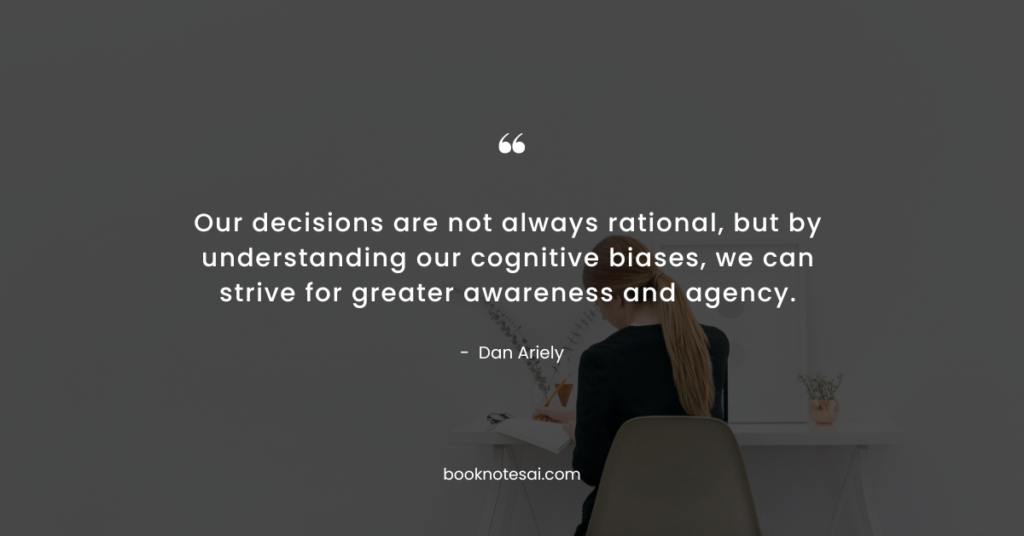Listen To This Post
Predictably Irrational: The Hidden Forces That Shape Our Decisions Book Summary: Understanding the Quirks of Human Behavior.

This is a book summary for Predictably Irrational: The Hidden Forces That Shape Our Decisions by Dan Ariely. The essential information is structured to be practical, clear, and really helpful, while also saving you a bunch of time.
Introduction: Why this book?
- In Predictably Irrational, Dan Ariely explores the fascinating world of human decision-making, shedding light on why we often make choices that defy logic.
- Understanding the concepts in this book can empower you to navigate the complexities of your own decision-making processes, offering insights into consumer behavior, relationships, and personal finance.
Predictably Irrational Summary:
- Dan Ariely reveals how our decisions are influenced by irrational forces, challenging the traditional economic model of human behavior.
- Through engaging anecdotes and research findings, Ariely demonstrates how predictable patterns of irrationality shape our everyday choices.
- The book delves into topics such as the influence of free offers, the power of expectations, and the pitfalls of relativity in decision-making.
- Ariely offers practical strategies for recognizing and mitigating the impact of irrational forces on our decisions, empowering readers to make more informed choices in their lives.
- By uncovering the hidden biases that govern our behavior, Predictably Irrational prompts readers to rethink their assumptions about rationality and offers a fresh perspective on human nature.
💡 5 Big Ideas
- The Myth of Rationality:
Dan Ariely challenges the notion of rational decision-making, revealing how irrational forces often drive our choices.
Understanding our inherent biases can help us make more mindful decisions in various aspects of life. - The Power of Expectations:
Ariely explores how our expectations influence our perceptions and experiences.
By managing expectations effectively, we can enhance satisfaction and optimize outcomes. - The Cost of Zero Cost:
Ariely discusses the paradoxical allure of free offers and how they shape consumer behavior.
Recognizing the hidden costs associated with “free” can help us make more deliberate choices. - The Influence of Social Norms:
The book explores how social norms and peer pressure influence our decisions.
Understanding the dynamics of social influence can empower us to resist conformity and make authentic choices. - The Importance of Choice Architecture:
Ariely emphasizes the significance of designing choice environments to facilitate better decision-making.
By structuring choices thoughtfully, we can nudge ourselves and others towards more desirable outcomes.
In summary, Predictably Irrational underscores the pervasive impact of irrationality on human behavior and offers practical insights for navigating the complexities of decision-making in various domains.
Powerful Quotes
- “The most difficult subjects can be explained to the most slow-witted man if he has not formed any idea of them already; but the simplest thing cannot be made clear to the most intelligent man if he is firmly persuaded that he knows already.”
This quote emphasizes the challenge of overcoming preconceived notions to embrace new perspectives. - “Knowing what I value, simplifies my life. It helps me to maintain focus and direction.”
This quote highlights the importance of self-awareness in guiding decision-making and prioritization. - “Most people don’t know what they want unless they see it in context.”
This quote underscores the influence of relativity in shaping our preferences and choices. - “The idea of ‘loss aversion’ is central to prospect theory: it’s the idea that losses hurt much more than gains feel good.”
This quote illuminates the psychological principle of loss aversion and its impact on decision-making. - “The problem of relativity is a serious one: It means that we can’t figure out what we want or what we like in isolation.”
This quote highlights how our preferences are influenced by the context in which choices are presented. - “The essence of this chapter is that we are often unaware of what drives our decisions.”
This quote underscores the subconscious factors that shape our behavior and decision-making. - “We may not be able to control the irrational forces that guide our decisions, but we can learn to recognize and mitigate their effects.”
This quote emphasizes the importance of self-awareness and cognitive reflection in decision-making. - “By understanding the quirks of human behavior, we can design choice environments that promote better decision-making.”
This quote highlights the role of choice architecture in influencing behavior and outcomes. - “Our decisions are not always rational, but by understanding our cognitive biases, we can strive for greater awareness and agency.”
This quote underscores the potential for self-improvement through reflection and insight into our decision-making processes. - “In the pursuit of rationality, we must embrace the reality of our irrationality.”
This quote encapsulates the paradoxical nature of human behavior and the need for humility in decision-making.
One Reason To Read This Book:
By reading Predictably Irrational, you gain invaluable insights into the hidden forces that shape human decisions, empowering you to make more informed choices in every aspect of your life.
Who should I recommend Predictably Irrational Summary to?
If you’re fascinated by human behavior and enjoy exploring the psychology behind decision-making, this summary is perfect for you.
Whether you’re a student, professional, or simply curious about the quirks of the human mind, Predictably Irrational offers valuable lessons applicable to various aspects of life.
Recommendations:
- Podcast: “Hidden Brain” by Shankar Vedantam offers intriguing insights into human behavior and decision-making.
- Article: “The Power of Choice Architecture” by Cass R. Sunstein explores the concept of choice architecture and its implications for policy and decision-making.
- Book: “Thinking, Fast and Slow” by Daniel Kahneman provides a comprehensive exploration of cognitive biases and heuristics that influence our decisions.
This summary serves as a complimentary guide to the reviewed title Predictably Irrational, offering key insights. For a deeper understanding, we encourage you to explore the full book.


